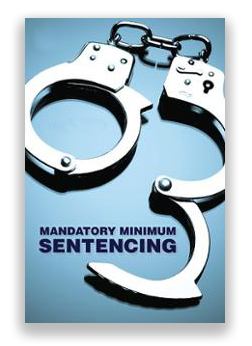We post news and comment on federal criminal justice issues, focused primarily on trial and post-conviction matters, legislative initiatives, and sentencing issues.

TWO BILLS CUTTING MANDATORY MINIMUMS, PROPOSING RETROACTIVITY, INTRODUCED IN SENATE
The important but piecemeal work of criminal justice reform continued last week with two significant bills being introduced in the Senate.
 Sens. Richard Durbin (D-Illinois), Mike Lee (R-Utah), and 11 cosponsors introduced S.1013, the Smarter Sentencing Act of 2021, seeking once again to reform some drug mandatory minimums. At the same time, Durbin and Sen. Charles Grassley (R-Iowa) introduced S.1014, the First Step Implementation Act of 2021.
Sens. Richard Durbin (D-Illinois), Mike Lee (R-Utah), and 11 cosponsors introduced S.1013, the Smarter Sentencing Act of 2021, seeking once again to reform some drug mandatory minimums. At the same time, Durbin and Sen. Charles Grassley (R-Iowa) introduced S.1014, the First Step Implementation Act of 2021.
The Smarter Sentencing Act, an updated version of the Smarter Sentencing Act of 2019 (which went nowhere), continues the mandatory minimum adjustments to 21 USC § 841(b), the sentencing section of the drug trafficking statute begun by the First Step Act. First Step adjusted mandatory life in § 841(b)(1)(A) to 25 years, and mandatory 20 years in the same subsection to 15 years. The Smarter Sentencing Act proposes similar adjustments:
(b)(1)(A): The 15-year mandatory minimum for a prior drug offense would drop to 10 years, and the 10-year mandatory minimum floor would drop to 5 years.
(b)(1)(B): The 10-year mandatory minimum for a prior drug offense would drop to 5 years, and the 5-year mandatory minimum floor would drop to 2 years.
Smarter Sentencing would also create a new category of `courier’ for a defendant whose role was limited to transporting or storing drugs or money. The mandatory minimum for a courier under 21 USC § 960, the importation statute, would essentially be cut in half. It would not affect mandatory minimums in 21 USC § 841(b).
Importantly, the bill makes its changes retroactive, enabling people who now have mandatory minimum sentences changed by the bill to ask their judges for a sentence reduction.
 Lee and Durbin first introduced the Smarter Sentencing Act in 2013. Several of its provisions made it into the First Step Act, which was enacted into law in 2018, but the changes in mandatory minimums for most drug offenses would not.
Lee and Durbin first introduced the Smarter Sentencing Act in 2013. Several of its provisions made it into the First Step Act, which was enacted into law in 2018, but the changes in mandatory minimums for most drug offenses would not.
“Mandatory minimum penalties have played a large role in the explosion of the U.S. prison population, often leading to sentences that are unfair, fiscally irresponsible, and a threat to public safety,” Sen. Durbin said in a press release. “The First Step Act was a critical move in the right direction, but there is much more work to be done to reform our criminal justice system. I will keep fighting to get this commonsense, bipartisan legislation through the Senate with my colleague, Senator Lee.”
Meanwhile, S.1014 – the First Step Implementation Act – is equally significant. It would extend retroactivity to anyone sentenced for drug or stacked § 924(c) offenses sentenced prior to the 2018 First Step Act and let judges waive criminal history limitations that keep defendants from getting the 18 USC § 3553 safety value.
Additionally, the bill corrects a weird anomaly in the First Step Act that redefined prior drug cases for which a defendant can get an § 851 enhancement (which increases the mandatory minimum where the defendant has certain prior drug convictions) to limit such priors to crimes punishable by more than 10 years for which the defendant was actually sentenced to more than a year. Under the 2018 bill, the change affected people sentenced under §§ 841(b)(1)(A) and (b)(1)(B), but not people sentenced under the lowest level of sentence, § 841(b)(1)(C). S.1014 applies the same “serious drug felony” definition to all three subsections.
The sleeper in S.1014 is that it would let virtually anyone sentenced under § 841(c) prior to the 2018 First Step Act seek a reduction using a procedure a lot like the Fair Sentencing Act retroactivity motions. The sheer number of motions likely to be filed might be enough to give Congress pause on this one.
 The bill also refines a number of Sentencing Commission goals – such as keeping down the prison population and ensuring that Guidelines don’t have adverse racial impacts. All of that would be great, but – as Supreme Court Justice Sotomayor noted last week – “currently, six of the seven voting members’ seats are vacant. The votes of at least four members are required for the Commission to promulgate amendments to the Guidelines.” The Commission has been paralyzed by lack of quorum since December 2018. The Senate has to confirm at least three new members – and none has yet been nominated by President Biden – before the Commission can do anything.
The bill also refines a number of Sentencing Commission goals – such as keeping down the prison population and ensuring that Guidelines don’t have adverse racial impacts. All of that would be great, but – as Supreme Court Justice Sotomayor noted last week – “currently, six of the seven voting members’ seats are vacant. The votes of at least four members are required for the Commission to promulgate amendments to the Guidelines.” The Commission has been paralyzed by lack of quorum since December 2018. The Senate has to confirm at least three new members – and none has yet been nominated by President Biden – before the Commission can do anything.
As for the two new bills, introduction hardly means approval. While Ohio State law professor Doug Berman is skeptical of their chances, he notes that “prior iterations of [the Smarter Sentencing Act] got votes in Senate Judiciary Committee from the likes of Ted Cruz and Rand Paul. Moreover, the current chair of the Senate Judiciary Committee is Senator Durbin and the current President campaigned on a platform that included an express promise to work for the passage of legislation to repeal mandatory minimums at the federal level. Given that commitment, Prez Biden should be a vocal supporter of this bill or should oppose it only because it does not go far enough because it merely seeks to ‘reduce mandatory minimum penalties for certain nonviolent drug offenses,’ rather than entirely eliminate them.
Committee on the Judiciary, Durbin, Lee Introduce Smarter Sentencing Act (March 26, 2021)
Congressional Record, Statements On Introduced Bills And Joint Resolutions (S.1013 and S.1014) (March 25, 2021)
Sentencing Law and Policy, Senators Durbin and Grassley re-introduce “Smarter Sentencing Act” to reduce federal drug mandatory minimums (March 26, 2021)
– Thomas L. Root


